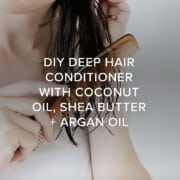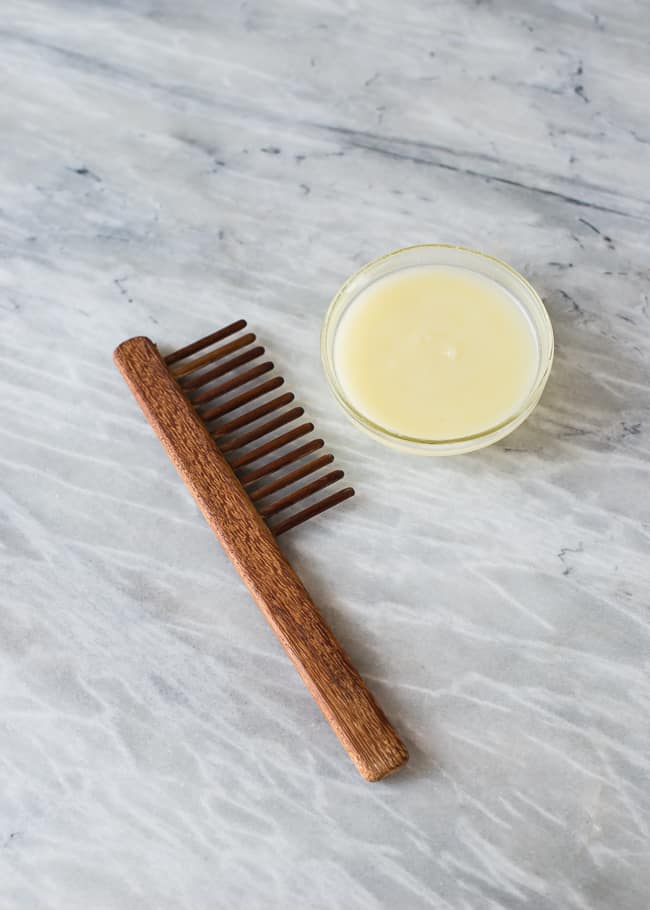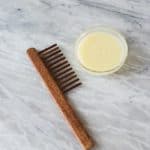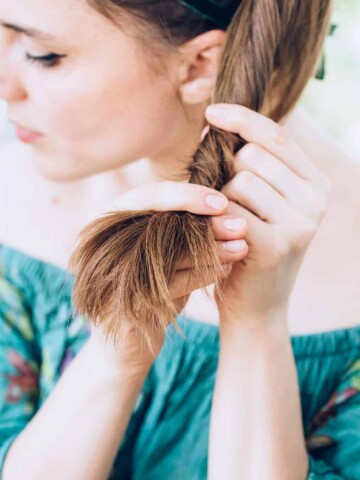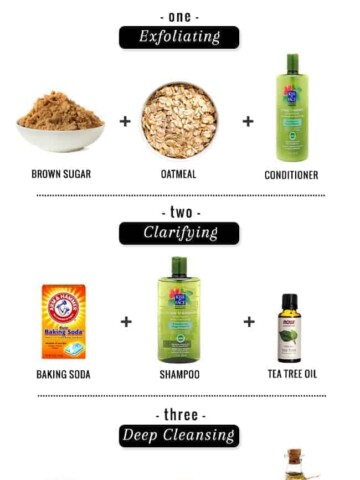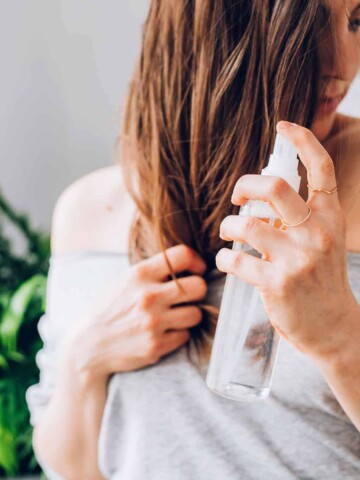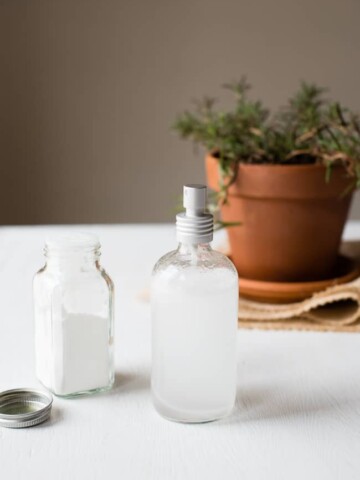We're heading into summer, and it's time to repair those damaged tresses with a DIY deep hair conditioner using some of our favorite beauty oils and butters. Even if you're diligent about pool hair care, the trifecta of chlorine, sun, and salt will draw out moisture, leaving your hair dry and brittle. And even if you don’t go in the ocean or pool, there is plenty of UV light damage from the summer sun as well as the chlorine in tap water, so freshening up your hair with a deep hair conditioner will do everyone some good.
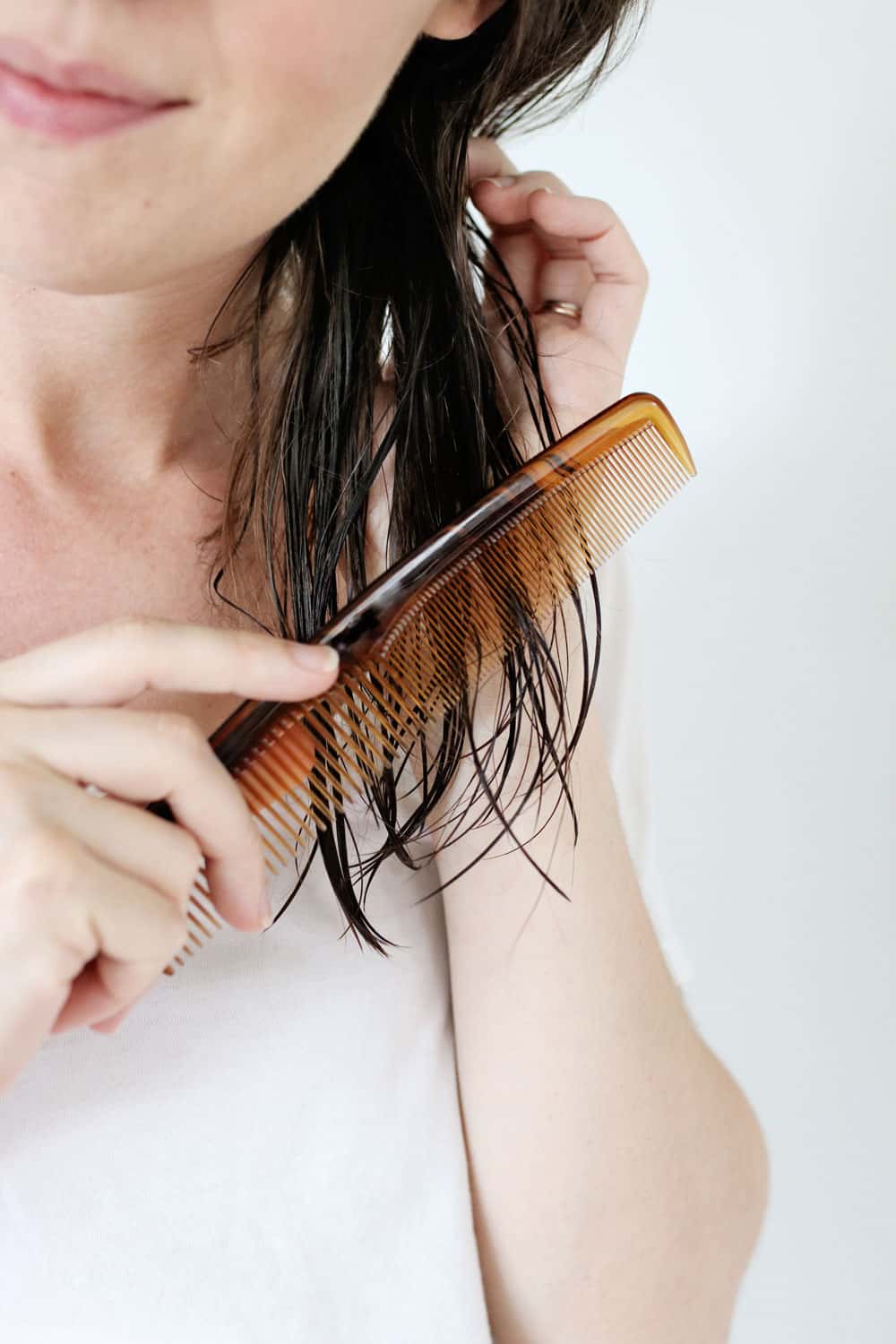
If your hair is feeling a little dry and damaged, repeat after me: deep conditioner, deep conditioner, deep conditioner! A deep conditioner can be made at home and will revive your hair after a winter of cold, dry air or a summer of sun and salt water.
Jump to:
What Is a Deep Hair Conditioner?
If you're looking to pamper your hair and give it some much-needed TLC, making your own deep conditioners at home can be a great option. Deep conditioners are designed to penetrate the hair shaft and nourish the hair from within, leaving it soft, shiny, and healthy. The best part is that you don't need to spend a fortune on expensive salon treatments when you can whip up your own deep conditioners using natural ingredients that you probably already have in your pantry.
To make your own deep conditioners, start by choosing ingredients that are known to be beneficial for hair health. Some great options include avocado, coconut oil, honey, and egg yolk. You can mix and match these ingredients to create a custom deep conditioner that meets your specific hair needs. For example, if you have dry, damaged hair, you might want to use coconut oil and honey to add moisture and shine. On the other hand, if you have fine, thin hair, you might want to use egg yolk and aloe vera to add volume and thickness. Once you have your ingredients, simply mix them together, apply to your hair, and leave on for 20-30 minutes before rinsing out. With regular use, these homemade deep conditioners can help restore your hair's natural beauty and vitality.
DIY Deep Hair Conditioner
I found this deep hair conditioner recipe and adapted it a bit for my family's hair. I like the combination of shea butter with coconut oil, rather than using olive oil (although olive oil is great for your hair, too).
And of course, you can massage coconut oil directly onto the ends of your hair anytime for a quick and convenient leave-in conditioner. It moistens and makes it smell like a day at the beach. (I find that works especially well when you can't even get a comb through your kid's tangled mass of hair.)
For a more intense conditioner, this hair mask adds a ton of moisture, and it's worth the extra few minutes to melt the oils together and whip it into a creamy texture. The thicker consistency makes the conditioner easier to control when applying it to your hair. You don't want to glop on all of the oil in one place!
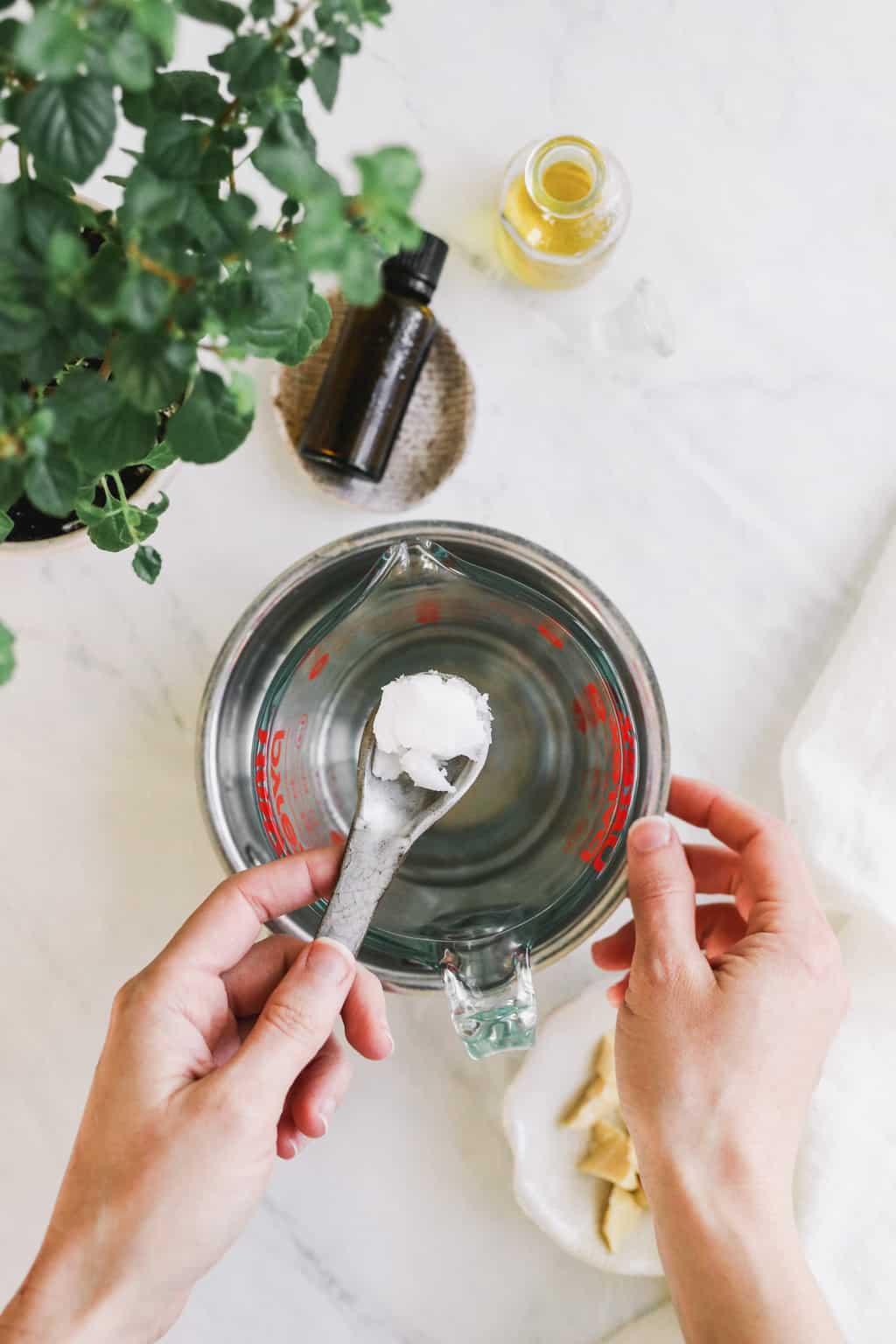
The Best Oils for Different Hair Types
By now, you probably already know that coconut oil can pretty much do anything, including repairing damaged hair and preventing further hair breakage. Argan oil is great for controlling frizz and adding shine to dull hair [source].
Shea butter not only adds moisture and shine, but it can also help remedy dandruff and a dry scalp. This deep hair conditioner has some serious deep conditioning power!
But you're not limited to just the oils and butters we are used to hearing about. Different oils have various properties, so if you're looking to tailor this recipe to your own hair type, here's how to make 'em work for you:
Deep conditioning for dry or frizzy hair: Argan oil
Deep conditioning for oily scalp or limp hair: Grapeseed oil
Deep conditioning for extremely dry or damaged hair: Macadamia oil
Deep conditioning for sensitive or flaky scalp: Almond oil
Deep conditioning for flakes and dandruff: Shea butter
Deep conditioning for boosting growth: Olive oil
And adding a few drops of an essential oil for your hair is the icing on the deep-conditioning cake. Rosemary, lavender, peppermint—all are great essential oils for strengthening and deep conditioning your hair as well as making your strands smell like you just left the spa.
Just like with carrier oils, some essential oils are better than others at hydrating strands and boosting hair health. In addition to rosemary, lavender, and peppermint, here are a few we love for gorgeous locks:
Cedarwood: said to help balance oil-producing glands in the scalp, so hair looks less greasy
Lemongrass: may relieve scalp irritation and itchiness, helps to treat dandruff [source]
Thyme: an antimicrobial oil that helps keep bacteria at bay [source]
Clary sage: cleanses oils and nourishes dry skin
Tea tree: antimicrobial and antifungal making it ideal for dandruff-prone hair [source]
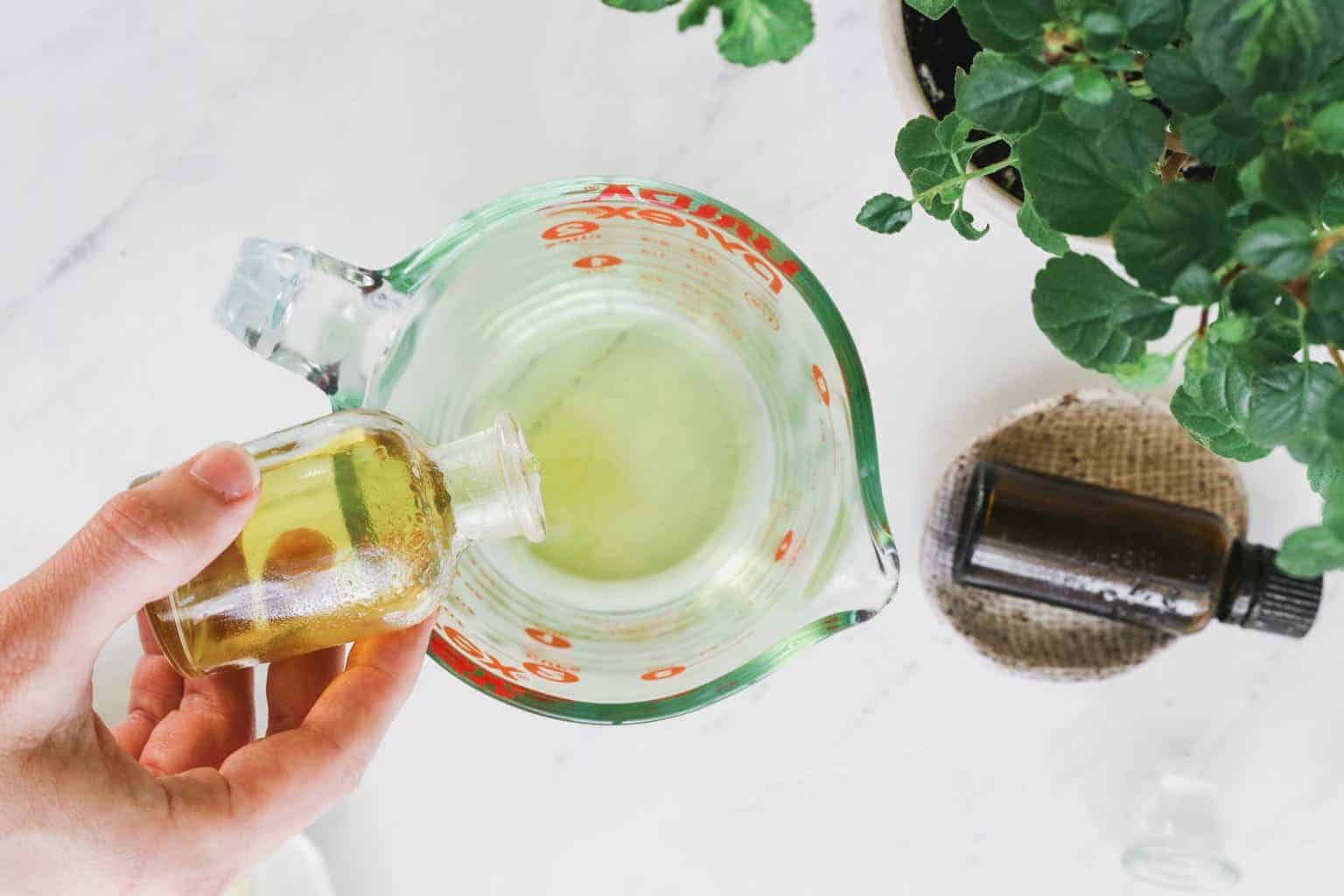
How to Do a Deep Conditioner Treatment
You can turn your deep hair conditioner into a hot oil treatment by warming the oils in the microwave or applying the mask as usual and just stepping outside in the sun for a few minutes. You can also put them on and then relax in a nice hot tub or jacuzzi. The warmth opens up the hair cuticle so the moisturizing oils can better penetrate your strands. This will go a long way towards repairing damaged hair and preventing hair breakage by restoring natural oils. It's great for all hair types too!
First, comb your hair to remove any knots. Then apply the conditioner from root to tip, massaging your scalp as you apply it. This can also stimulate hair growth. Wrap your hair in a warm, damp towel to encourage the oil to sink in even further and let it sit for 20–30 minutes. Rinse hair thoroughly before applying shampoo and conditioner as usual.
For even more conditioning power, try an overnight hair mask.
Olive Oil As a Deep Conditioner
Olive oil is an excellent natural hair conditioner that can deeply moisturize and nourish your locks. When used as a deep conditioner, it can help repair damaged hair, reduce frizz, and promote hair growth. While traditional deep conditioners contain synthetic chemicals that may cause harm to your hair, olive oil is a safe and natural alternative that has been used for centuries. It's great for dry hair - and available right in the grocery store! Some people believe it's great for hair growth as well, although it hasn't been proved.
To use olive oil as a deep conditioner, start by choosing a high-quality, extra-virgin olive oil. Warm up the oil in a microwave-safe bowl or in a pot on the stove, but be careful not to overheat it. You want it to be warm to the touch, but not hot enough to burn your skin. Apply the oil generously to your hair, making sure to cover every strand from the roots to the tips. Use a wide-tooth comb to distribute the oil evenly and ensure that it penetrates the hair shaft.
Once you have applied the olive oil, cover your hair with a plastic shower cap or a towel to trap in the heat and enhance absorption. Leave the oil on your hair for at least 30 minutes, but preferably for several hours or overnight if possible. This will give the olive oil enough time to deeply penetrate your hair and provide maximum conditioning benefits.
After the recommended time has passed, rinse your hair thoroughly with warm water and a gentle shampoo. You may need to shampoo twice to remove all the oil from your hair. Finish by applying your regular conditioner to lock in moisture and enhance shine.
For best results, repeat this deep conditioning treatment with olive oil once a week for six weeks. By the end of the six weeks, you should notice a significant improvement in the texture, softness, and overall health of your hair. You can also alternate between using olive oil and a traditional deep conditioner every two weeks to give your hair a variety of nutrients and keep it looking its best and promote hair growth.
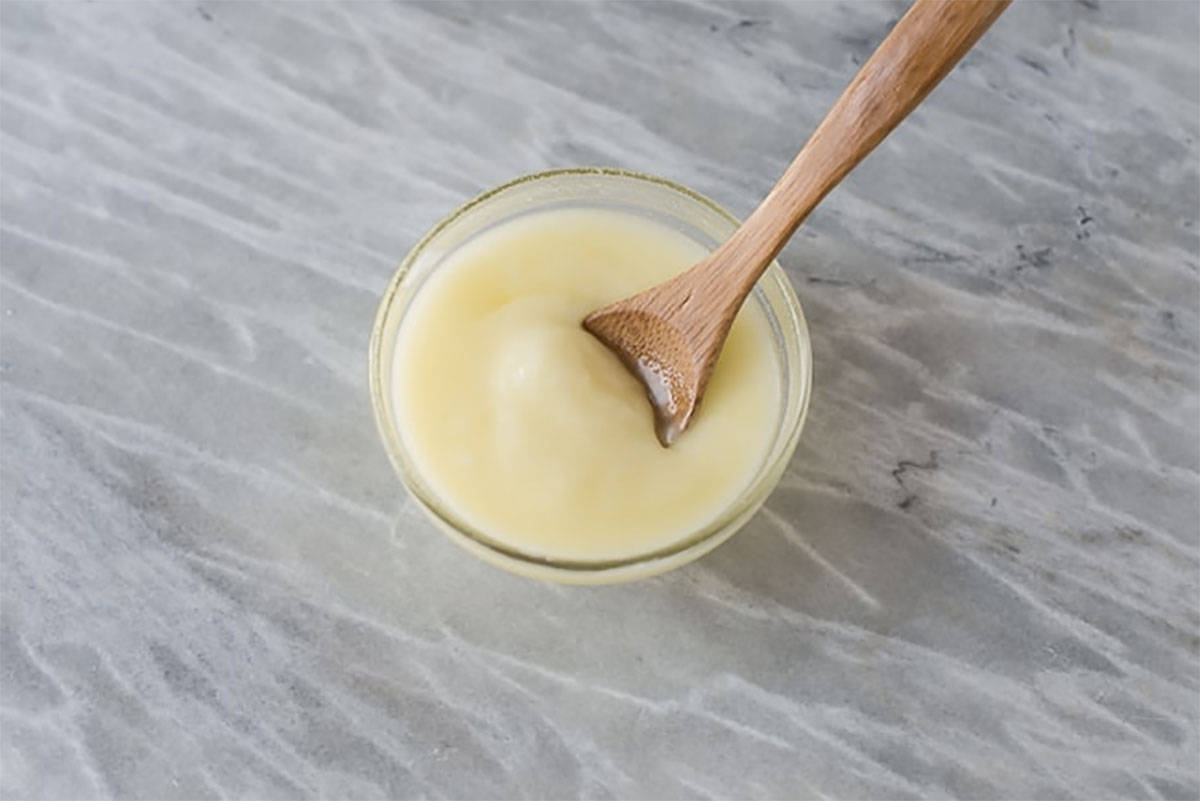
Variation for Damaged Hair
If you have damaged hair, a homemade deep conditioner can help repair and soften your hair, stimulate hair growth, and promote shine.
To make your own deep conditioner, start by mixing half an avocado, two egg yolks, and a tablespoon of natural humectant such as honey in a small bowl. Add two to four tablespoons of olive oil and a few drops of your favorite essential oil, such as rosemary essential oil, known for stimulating hair follicles, and mix well.
Apply the mixture to your hair, making sure to focus on the damaged ends. Use a wide-tooth comb to distribute the mixture evenly, and then cover your hair with a plastic bag. To enhance the effects of the conditioner, use a blow dryer to gently heat the plastic bag for a few minutes. Leave the conditioner on for 15-20 minutes and then rinse it off with cool water.
For healthier locks, deep condition your hair regularly, at least once a week as part of your hair care regimen. Avoid using a hair dryer and opt for air drying instead. This DIY hair mask can work just as well as a store-bought deep conditioner, and over a decade of using it, it has helped repair my split ends and promote healthy hair growth.
FAQ
A deep conditioner is a hair care product that is designed to provide more intensive conditioning and nourishment to the hair than regular conditioner. It is typically thicker and heavier than regular conditioner, and is often left on the hair for a longer period of time, usually between 10-15 minutes, in order to allow the ingredients to penetrate the hair shaft more deeply.
Natural deep conditioners are hair care products that are made with natural ingredients such as oils, butters, and other plant-based extracts. These ingredients are often chosen for their nourishing and moisturizing properties, and they can help to restore damaged or dry hair.
I swear by baking soda. Next time you're in the shower after applying a deep conditioner, simply sprinkle it in your hair before washing it with shampoo. Use your fingertips to gently massage the baking soda at the roots and along the length of your hair.
Then rinse it out and shampoo as usual. The baking soda helps break down grease and leaves hair feeling squeaky clean, without the drying suds of traditional shampoo.
I have also heard that applying dry shampoo (this kind is my favorite) to hair 1–2 hours before showering will absorb the excess oil and make it easier to wash out.
Sure! But you may find that the oils linger and leave your hair looking flat and somewhat greasy. If that's the case, it might be best to shampoo when you're done. It just depends on your hair type and how you prefer to wear it.
Since it just contains oil, it should last for about a year without the need for refrigeration or preservatives. If you add any water-based ingredients, like aloe vera, rose water, etc., it should be refrigerated and used within a week. Instead, you can add those extra ingredients just to the portion you will be using on your hair at that time.
Yes, this is safe to use long term as long as you don't see any redness or irritation. As with any homemade beauty products, keep an eye out for changes in your skin and hair (such as redness, acne, hair loss, etc.) and stop using it immediately if some signs of irritation crop up.
Yep! It would make a great homemade conditioner. But again, since it's pretty oil-heavy—depending on your hair type—you may find that it leaves your hair feeling a little greasy, and it loses its bounce. If that's the case, you may prefer to shampoo and condition after the application.
I wouldn’t add it to the recipe itself, just combine it with the portion of oil you are going to apply at the time. Here is a homemade mayo mask recipe. Feel free to add any natural ingredients you like, and let us know how it goes in the comments!
If your hair is dry or damaged, you can use this twice a week until your hair feels softer and more manageable. For regular maintenance, use it once every week or two to replenish the moisture you lose from heat styling.
This conditioner is pretty oil-heavy, so oils may linger in your hair after you use it. It's more noticeable in fine hair, but any hair type can be affected. Just use shampoo after your deep conditioning treatment to get rid of lingering oils and leave hair feeling soft and clean. You can also consider doing a citrus or vinegar rinse to cut the extra oil and add in some extra shine.
To use a natural deep conditioner, start by washing your hair with a gentle shampoo. Then, apply the deep conditioner to your hair, focusing on the ends, hair shaft and any areas that are particularly dry or damaged. Leave the conditioner on for 10-15 minutes (or as directed on the product), then rinse thoroughly with warm water.
Yes, most natural deep conditioners are suitable for all hair types, including curly, straight, fine, and thick hair. But you should choose a deep conditioner that is formulated for your specific hair type and concerns.
Using a deep conditioner regularly can help to nourish and strengthen your hair, leaving it softer, smoother, and more manageable. It can also help to repair damage from heat styling, chemical treatments, or environmental factors, and can improve the overall health and appearance of your hair.
Deep Hair Conditioner
Equipment
- Pyrex measuring cup and a saucepan (or a small bowl and a microwave)
- Hand mixer
Materials
- 2 tablespoons coconut oil
- 1 tablespoon shea butter
- 1 teaspoon Argan oil
- A few drops of essential oil good ones for hair are rosemary, lavender, peppermint, geranium, and clary sage
Instructions
- Melt coconut oil and shea butter together in microwave or double boiler (I find a Pyrex measuring cup in a saucepan of hot water works well.)
- Let mixture cool until almost room temperature, then add the argan oil.
- With a hand mixer, whip mixture together for 3–5 minutes (transfer to a larger bowl, if needed, to accommodate the hand mixer). You'll get a creamy texture that's much easier to apply than melted oil.
- Comb through clean, dry hair and let sit for 30 minutes. Rinse hair and shampoo as normal.
Notes
This post was medically reviewed by Dr. Jennifer Haley, a board-certified dermatologist with extensive experience in medical, cosmetic and surgical dermatology. Learn more about Hello Glow’s medical reviewers here. As always, this is not personal medical advice and we recommend that you talk with your doctor.
Related
Want more ways to care for your hair naturally? Here are some recipes you can try:

